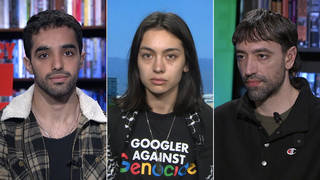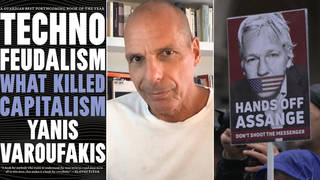
Related
Topics
Guests
- Sahr MuhammedAllyattorney with Human Rights First. She observed part of the war crimes tribunal at Guantanamo.
In the first US war crimes tribunal since World War II, a jury of six senior military officers has convicted Osama bin Laden’s former driver of two charges of material support for terrorism but acquitted him of the most serious charges. Salim Hamdan is the first prisoner held at Guantanamo to be tried before a tribunal. He has been in custody since November 2001. We speak with Sahr MuhammedAlly, an attorney with Human Rights First. She was at Guantanamo last week observing part of the Hamdan war crimes tribunal. [includes rush transcript]
Transcript
ANJALI KAMAT: In the first US war crimes tribunal since World War II, a jury of six senior military officers has convicted Osama bin Laden’s former driver of two charges of material support for terrorism but acquitted him of the most serious charges.
Salim Hamdan is the first prisoner held at Guantanamo to be tried before a tribunal. He has been in custody since November 2001.
Human rights groups condemned the military tribunal system, in part because it allowed the military to base its case on secret evidence and evidence obtained through torture. But Pentagon spokesperson J.D. Gordon praised the proceedings.
J.D. GORDON: Well, as we’ve seen here over the past several weeks, Mr. Hamdan did receive a full and fair trial. He was convicted of material support to terrorism, five specifications out of eight that he was charged with. And as we can see, the military commissions process is moving forward.
ANJALI KAMAT: One of Salim Hamdan’s attorneys, Mike Berrigan, spoke to the press at Guantanamo shortly after the verdict was announced.
MIKE BERRIGAN: It’s important to note that he was acquitted of the most important charge, the government conspiracy charge, both specifications of it. He’ll never face that charge again, was found not guilty. He was found guilty of five specifications of material support — not all of those material support charges; he was acquitted of three of them.
AMY GOODMAN: Sahr MuhammedAlly joins us here in our firehouse studio. She’s an attorney with Human Rights First. She was at Guantanamo last week observing part of the Hamdan war crimes tribunal. Welcome to Democracy Now!
SAHR MUHAMMEDALLY: Thank you for having me.
AMY GOODMAN: Your response to the verdict?
SAHR MUHAMMEDALLY: Well, I mean, the verdict is just window dressing to the government’s agenda. You know, the government is going to decide whether somebody is going to be released when the end of the war on terror. So these military commissions proceedings are just window dressing to what the government wants to do.
AMY GOODMAN: Were you surprised?
SAHR MUHAMMEDALLY: I wasn’t surprised. I mean, I was maybe surprised a little bit in the sense that he was not — he was acquitted on conspiracy, but then it goes to show that the jury members really took their duty very seriously, and they were not going to buy the government’s argument hook, line and sink.
ANJALI KAMAT: Sahr MuhammedAlly, can you describe the proceedings of the tribunal and the kind of evidence that was allowed and not allowed?
SAHR MUHAMMEDALLY: Well, you know, there are two images of Guantanamo. One is that we saw in the trial, at least to a certain degree, where these FBI interrogators go in and had spoken to Mr. Hamdan, and they’re part of the clean team who are going to talk about and testify in court regarding statements that defendants had made and Salim Hamdan made to them, and these don’t — you know, they are — they don’t have sort of the — you know, there’s no — these are not — and then there’s another part of Guantanamo that is the one that authorized sleep deprivation and torture and coercive interrogation techniques at the Pentagon, you know, by Rumsfeld, etc.
And you won’t hear — the government is going to try not to bring that sort of evidence in court and is going to say, well, all of these statements have come in through these rapport-building techniques. But, you know, the government — you know, just a few hours before the trial began, the government suddenly produced documents, which Mr. Hamdan had been alleging that he was subjected to sexual humiliation, as well as to sleep deprivation. And the court never really got a sense to find out what exactly happened in those circumstances.
AMY GOODMAN: Can you talk about what you were able to observe in this trial? What was secret, and what was public?
SAHR MUHAMMEDALLY: Well, the government decides — you know, it’s a very ad hoc basis of what is secret. I mean, at one point, when the defense was going to bring in two defense witnesses, we were all taken out of the courtroom, because two of the people were involved with Special Forces. And so, we never got a chance to hear about how Mr. Hamdan was treated by intelligence agencies.
In fact, there’s like a black hole in Mr. Hamdan’s detention records, and the government hasn’t provided that to the defense. There’s an entire month in December of 2001 where we know that he was interrogated by intelligence agencies, but the government has issued a protective order, where even the CIA cannot be mentioned in court.
So we were — the observers who didn’t have top secret security clearance were taken out of the courtroom. And so, we never got a chance to hear what happened to Mr. Hamdan when he was being interrogated by these agencies, as well as whether he cooperated with some of the intelligence agencies.
AMY GOODMAN: Who testified in secret?
SAHR MUHAMMEDALLY: It was Colonel Banks, who is a member of the Special Forces, as well as another colonel who is affiliated with Task Force Bowie. And that’s all we know, because we were only allowed to be present when the person was sworn in, and then we were asked to leave the courtroom.
AMY GOODMAN: It’s very interesting that Colonel Banks was testifying in secret, because there’s this big controversy going on within the American Psychological Association about its refusal to ban members from participating in coercive interrogations. And when the controversy started growing, the APA set up a task force, the PENS Task Force, Psychological Ethics and National Security. There were nine voting members; six of them were tied to the military. One of them was Colonel Morgan Banks, who was a senior, well, SERE psychologist — that’s Survival, Evasion, Resistance, Escape — responsible for the training and oversight of Army SERE psychologists. The non-military members of that task force did not realize the depth to which he was connected, and here they were, supposedly objectively analyzing whether the American Psychological Association should be involved in these techniques. But you couldn’t know what he said?
SAHR MUHAMMEDALLY: We were not allowed to hear what he said. And, you know, the government has decided — even, for example, at one point, when Mr. Hamdan’s lawyer was questioning a government witness, something about in the 9/11 Commission report, which is a public document, you know, was a bestseller in the New York Times, the government said this is classified.
ANJALI KAMAT: Can you explain exactly what he was convicted of? Salim Hamdan was acquitted — got a “not guilty” verdict on the charge of conspiracy, but what was he acquitted of?
SAHR MUHAMMEDALLY: He was — yeah, he was acquitted of, yeah, conspiracy, but he was convicted of material support for terrorism.
And, you know, one of the biggest critiques of the — in addition to what you had said earlier about coercive interrogation and evidence coming in in that sense, but — is that, you know, the government has codified material support and conspiracy as war crimes. And these are not war crimes. I mean, these are criminal — these are violations of federal criminal law, but these are not war crimes. And it is an ex post facto application of the law, making something a law, which wasn’t — making something a crime, which wasn’t a crime at the time that it was committed.
So what’s interesting is that, as you were saying earlier in the introduction, was — you know, the first war crimes tribunal since World War II is somebody who’s this low-level, Osama bin Laden’s driver, and he’s — and, you know, he’s being convicted as a war criminal for being a driver.
ANJALI KAMAT: And, Sahr MuhammedAlly, what would have happened to Salim Hamdan if he had been found not guilty of all of the charges?
SAHR MUHAMMEDALLY: Well, as I said earlier, the government would decide whether he would be released or not, because he’s been declared as an enemy combatant, and the government’s position is that they can detain enemy combatants ’til the end of the war on terror, and that could be indefinite.
AMY GOODMAN: Finally, when will he be sentenced? What do you expect? And who’s next?
SAHR MUHAMMEDALLY: Well, he — the sentencing hearing began yesterday. And so, we may hear a verdict today. I mean — and the next trial is for a Canadian citizen, Omar Khadr, who was detained, captured when he was fifteen years old in Afghanistan.
AMY GOODMAN: We want to thank you very much for being with us. Sahr MuhammedAlly is an attorney with Human Rights First, observed part of the war crimes tribunal at Guantanamo, the first since World War II.












Media Options